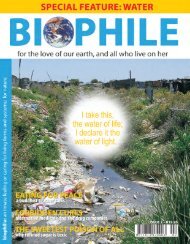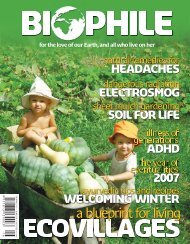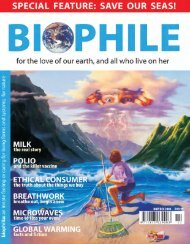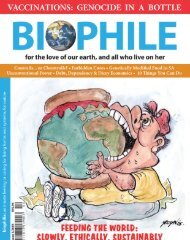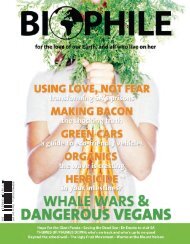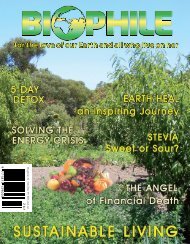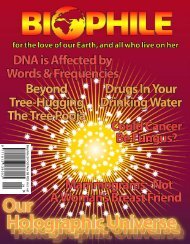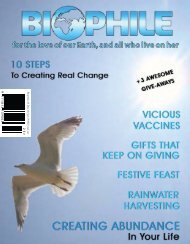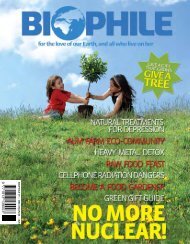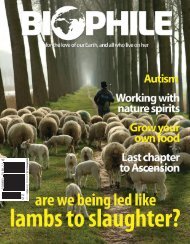B io ph ile Issu e 18 - Biophile Magazine
B io ph ile Issu e 18 - Biophile Magazine
B io ph ile Issu e 18 - Biophile Magazine
You also want an ePaper? Increase the reach of your titles
YUMPU automatically turns print PDFs into web optimized ePapers that Google loves.
after the area had been sprayed againstmosquitoes, a Massachusetts friend ofCarson's wrote a letter to the BostonHerald in 1958 demanding that officials"stop the spraying of poisons from the air."Carson read the letter and realized that"everything which meant most to me as anaturalist was being threatened." She decidedto make DDT the subject of her nextbook, tentatively entitled Man Against theEarth.represent our willingness to rush aheadand use something new without knowingwhat the results are going to be."Suddenly in a single summer, chemicalscience had fallen from its pedestal. By lateAugust, reporters were asking PresidentKennedy if federal officials would beinvestigating the long-range effects ofpesticides. "They already are," he answered"I think particularly, of course, since MissCarson's book, but they are examining theAccording to the WorldwatchInstitute, a higher percentage ofcrops in America are now lost topests than before pesticides werefirst widely used.chapters, theauthor followed thetrail of pesticides from farm to familytable, provided a "Who's Who" of toxicchemicals—DDT, chlordane, malath<strong>io</strong>n,parath<strong>io</strong>n—and noted that pesticides accumulatein fatty tissues of organisms.React<strong>io</strong>n to S<strong>ile</strong>nt Spring was quick,strong and largely negative. Life claimedthat Carson had "overstated her case."Time, citing scientists' claims that insecticideswere "harmless," dismissed it as an"emot<strong>io</strong>nal and inaccurate outburst." Thechemical and food industries came afterCarson aggressively. Chemical and EngineeringNews, a chemical industry trademagazine, linked Carson with "pseudoscientistsand faddists," denounced her"high-pitched sequences of anxieties" andbelittled her credentials. The Nutrit<strong>io</strong>nFoundat<strong>io</strong>n ma<strong>ile</strong>d scathing reviews of thebook to newspapers. The Nat<strong>io</strong>nal AgriculturalChemicals Associat<strong>io</strong>n launcheda $250, 000 campaign to refute it, andthe Monsanto Corporat<strong>io</strong>n published aparody of Carson's opening fable, describinga world without pesticides, overrunby insects and disease. In a cartoon in theNovember 10, 1962, issue of the SaturdayReview, a man lamented "I had just cometo terms with fallout, and along comesRachel Carson."But there were voices of praise as well.Supreme Court Justice William O. Douglascalled S<strong>ile</strong>nt Spring "the most importantchronicle of this century for the humanrace."Wh<strong>ile</strong> undergoing debilitating radiat<strong>io</strong>ntreatments, Carson answered hercritics.No civilizat<strong>io</strong>n, she said,"can wage relentless war onlife without destroying itself,and without losing the rightto be called civilized."But working on it in 1960, she was diagnosedwith breast cancer and underwenta mastectomy. Subsequent radiat<strong>io</strong>n treatmentsleft her nauseated and bedridden.The book she had expected to finish in afew months dragged on for four years.Finally, inJune 1962, the first of a threepartexcerpt from S<strong>ile</strong>nt Spring appearedin the New Yorker magazine. Beforethe final instalment hit newsstands, theVelsicol Corporat<strong>io</strong>n, which manufacturedthe pesticide chlordane (bannedin 1988), threatened to sue the magazinefor libel. "Everything in those articles hasbeen checked and is true," replied the NewYorker's legal counsel. "Go ahead and sue."The company never did, but the attackshad only begun. One reader wrote thatCarson's work "probably reflects her Communistsympathies."Then, in July, news broke that a supposedlyharmless drug given to thousands ofpregnant women in Europe for morningsickness had been determined to causewidespread birth defects. Newspapers andmagazines ran <strong>ph</strong>otogra<strong>ph</strong>s of babies bornwithout arms and legs or otherwise <strong>ph</strong>ysicallydeformed. "It's all of a piece," said Carson."Thalidomide and pesticides—theymatter."S<strong>ile</strong>nt Spring went on sale September27 and raced to the top of the New YorkTimes best-seller list where it stayed formost of the fall. By Christmas, the book,which begins with Carson's fable aboutan idyllic countryside that teemed withwildlife until "a strange blight crept overthe area and everything began to change,"had sold more than 100,000 copies. In subsequentShe insisted she was not against all pesticidesand had never called for banningthem, only for restricting their use. Publicopin<strong>io</strong>n wavered. Then televis<strong>io</strong>n tippedthe scales in her favor.In April 1963, 15 mill<strong>io</strong>n Americanswatched CBS Reports' "The S<strong>ile</strong>nt Springof Rachel Carson.""We still talk in terms of conquest," Carsonsaid. "I think we're challenged, as mankindhas never been challengedbefore, to prove our maturity andour mastery, not of nature but ofourselves."Her thoughtful and reservedpresentat<strong>io</strong>n struck a chord withviewers: hundreds wrote concerned lettersto Carson, CBS, the USDA, the PublicHealth Service and the PDA. A month later,President Kennedy's Science AdvisoryCommittee released its own report onpesticides, which backed Carson's thesis,criticized the government and the chemicalindustry, and called for "orderly reduct<strong>io</strong>nsof persistent pesticides."Today, despite the banning of DDT in1972, pesticides are still widely used, andCarson, who died in 1964 at age 56 ofheart disease and the cancer she battledso valiantly, still comes in for criticism."Rachel Carson's book was a brilliant pieceof writing and a seminal work, but it's clearnow that she was more fearful of pesticidesthan was warranted," says DennisAvery, former sen<strong>io</strong>r agriculture expertB<strong>io</strong><strong>ph</strong><strong>ile</strong> <strong>Issu</strong>e <strong>18</strong>17



